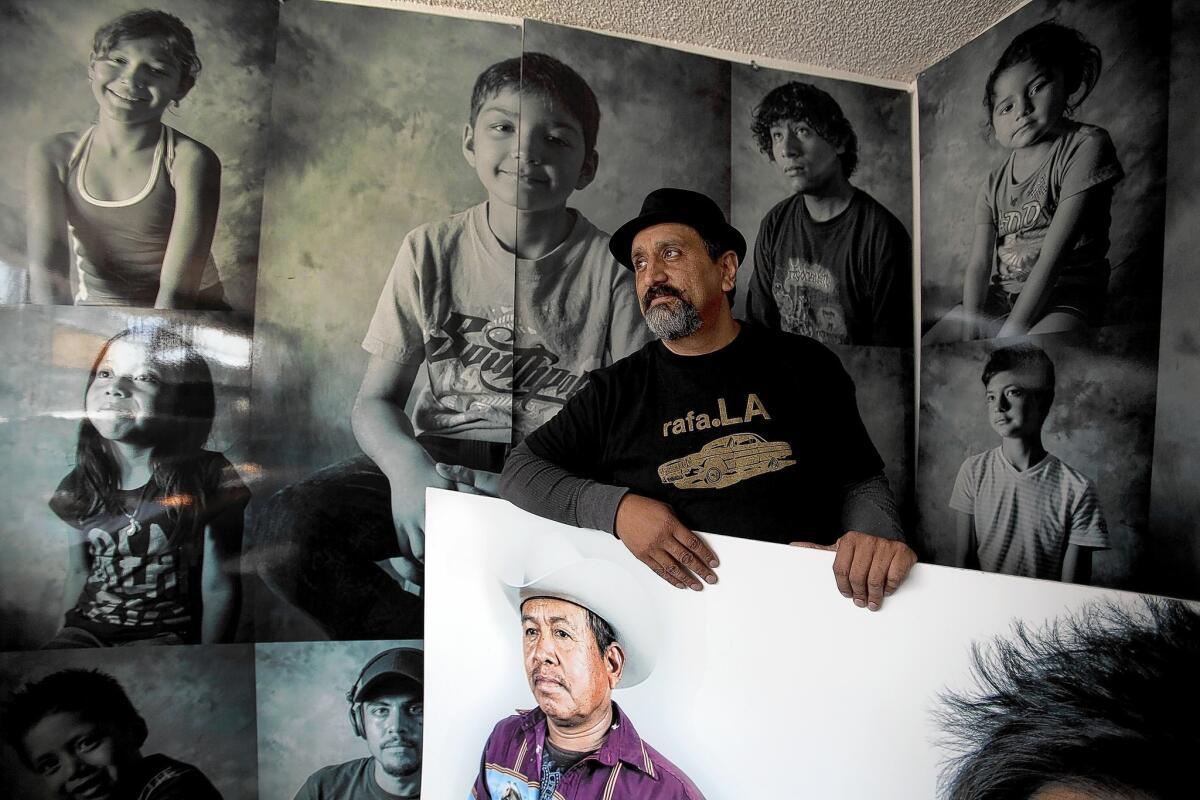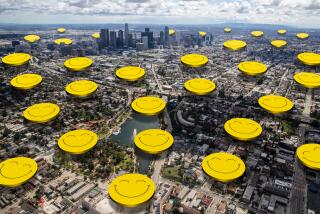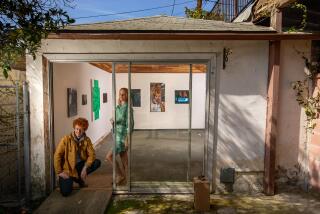Individual portraits capture a community

They came as they were — in sandals, without makeup, their hair a bit askew. A little girl with her plastic doll. A mother of one with her pregnant belly. A cowboy with wild horses galloping on his shirt.
It was picture day on the Eastside not long ago, and people — grandmothers, couples, children and teenagers — lined up to pose. The shoots were spontaneous, set up on the street without notice, as part of a 40th-anniversary project organized by Self Help Graphics & Art, Boyle Height’s historic community art center.
The result is a time capsule of images, as alluring as the murals of Boyle Heights. But real.
Photographs, shot over three days in the fall, are now on display in an online gallery on Self Help Graphics’ website. A physical exhibit may take place in the near future, executive director Evonne Gallardo said.
“This was a way to capture us as we are,” Gallardo said. “To say, ‘We don’t care if your hair’s not done. You are beautiful and you are special and you are part of this community.’”
The idea for the project — called Reflejos y Regalos de East Los, or Reflections and Gifts from East Los Angeles — came about three years ago when Self Help relocated to Boyle Heights from its longtime space in East L.A.
During the move, staffers discovered a box filled with old black-and-white photographs: portraits of people around town and in their homes. There were no names, no dates, no sign of why the images were taken.
The center tried tracking down the photographer, with no luck.
“They were so wonderful, we thought, why not take current photographs of people today?” Gallardo said.
With grants from the Pasadena Art Alliance and the National Endowment for the Arts, Self Help partnered with Rafael Cardenas, a local street photographer.
They chose three locations to shoot in Boyle Heights: Mariachi Plaza, Hollenbeck Park and the Lou Costello Recreation Center.
Cardenas set up a no-frills photo booth: a canopy, backdrop (one white, one gray) and strobe lights. Then he invited passersby to step in front of his camera.
The children were a slam dunk. Adults, on the other hand, played hard to get. My shirt’s not ironed. I’m not photogenic. I just got off work.
Eventually, relatives and friends lured many in.
Cardenas tried his best, from behind the lens, to make each person feel comfortable. He let hams do their thing. He asked others: “What’s your dream? Just imagine your dream and all the hard work it will take to accomplish it.”
One 19-year-old man at Costello told him his baby was born the night before. Another, on his way to a gig, asked to be photographed with his beloved saxophone. And a girl, about 8, fought back laughter as a group of her friends heckled her in the background.
In total, nearly 100 people were photographed. Cardenas collected their names and phone numbers. Emails, too (although most of them didn’t have one).
Early this year, some of the images were blown up and turned into three giant portrait collages. The plan was to display the 8-foot-by-20-foot weather-resistant murals for 30 days in the same locations the photos were taken.
“We wanted to make the images a part of the landscape,” Gallardo said. “The area is filled with so many billboards and advertisements from outside companies selling products many of us can’t even afford. This was something more personal and reflective.”
The logistics, however, didn’t quite pan out.
At Mariachi Plaza, permits allowed the exhibit for one day only. At Hollenbeck Park, after a few weeks, city workers mistakenly took down the installation on a rainy day. And at Costello, the giant black-and-white panels inexplicably began to disappear.
The people featured in the photographs have become a mystery as well — much like the black-and-white images unearthed by Self Help.
Nearly 80% of the phone numbers given by people during the shoots have been disconnected. Only a few people showed up to the unveiling of the murals. And although Cardenas has their names, he can’t make out who’s who in the photos.
All that’s left are the memories of each of his subjects.
On his desk in his photo studio, he keeps a thick stack of the prints that were never collected by the people in them. The large ones hang proudly on his walls.
When he looks at the faces now, he sees just what he hoped to capture.
“They’re real, honest portraits,” he said. “Where you just see the person for who they are.”
Twitter: @LATbermudez
More to Read
Sign up for Essential California
The most important California stories and recommendations in your inbox every morning.
You may occasionally receive promotional content from the Los Angeles Times.











